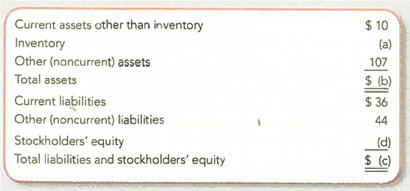
Fundamentals of Financial Accounting 4th Edition by Fred Phillips,Robert Libby,Patricia Libby
Edition 4ISBN: 978-0078025372
Fundamentals of Financial Accounting 4th Edition by Fred Phillips,Robert Libby,Patricia Libby
Edition 4ISBN: 978-0078025372 Exercise 25
Computing and Evaluating Financial Statement Effects of Alternative Inventory Costing Methods (Chapters 2 and 7)
You have been given responsibility for overseeing a bank's small business loans division. The bank has included loan covenants requiring a minimum current ratio of 1.8 in all small business loans. When you ask which inventory costing method the covenant assumes, the previous loans manager gives you a blank look. To explain to him that a company's inventory costing method is important, you present the following balance sheet information.

You ask the former loans manager to find amounts for (a), (b), (c), and (d) assuming the company began the year with 5 units of inventory at a unit cost of $11, then purchased 8 units at a cost of $12 each, and finally purchased 6 units at a cost of $16 each. A year-end inventory count determined that 4 units are on hand.
Required:
1. Determine the amount for (a) using FIFO, and then calculate (b) through (d).
2. Determine the amount for (a) using Weighted Average, and then calculate (b) through (d).
3. Determine the amount for (a) using LIFO, and then calculate (b) through (d).
4. Determine the current ratios using (i) FIFO, (ii) Weighted Average, and (iii) LIFO, and explain why these ratios differ.
5. Determine whether the company would be in violation or compliance with the loan covenant if the company were to use (i) FIFO, (ii) Weighted Average, and (iii) LIFO.
You have been given responsibility for overseeing a bank's small business loans division. The bank has included loan covenants requiring a minimum current ratio of 1.8 in all small business loans. When you ask which inventory costing method the covenant assumes, the previous loans manager gives you a blank look. To explain to him that a company's inventory costing method is important, you present the following balance sheet information.

You ask the former loans manager to find amounts for (a), (b), (c), and (d) assuming the company began the year with 5 units of inventory at a unit cost of $11, then purchased 8 units at a cost of $12 each, and finally purchased 6 units at a cost of $16 each. A year-end inventory count determined that 4 units are on hand.
Required:
1. Determine the amount for (a) using FIFO, and then calculate (b) through (d).
2. Determine the amount for (a) using Weighted Average, and then calculate (b) through (d).
3. Determine the amount for (a) using LIFO, and then calculate (b) through (d).
4. Determine the current ratios using (i) FIFO, (ii) Weighted Average, and (iii) LIFO, and explain why these ratios differ.
5. Determine whether the company would be in violation or compliance with the loan covenant if the company were to use (i) FIFO, (ii) Weighted Average, and (iii) LIFO.
Explanation

This question doesn’t have an expert verified answer yet, let Examlex AI Copilot help.
Fundamentals of Financial Accounting 4th Edition by Fred Phillips,Robert Libby,Patricia Libby
Why don’t you like this exercise?
Other Minimum 8 character and maximum 255 character
Character 255


